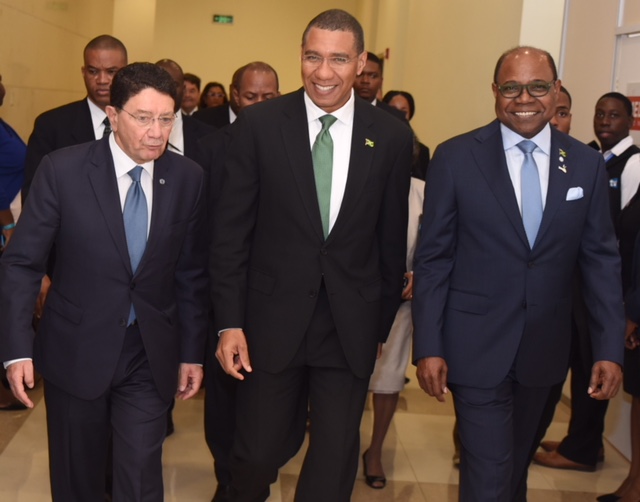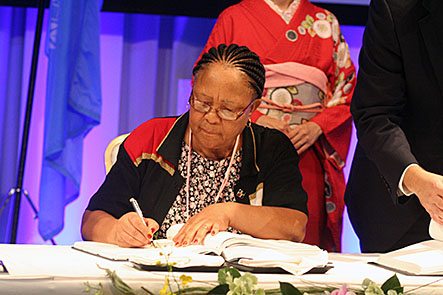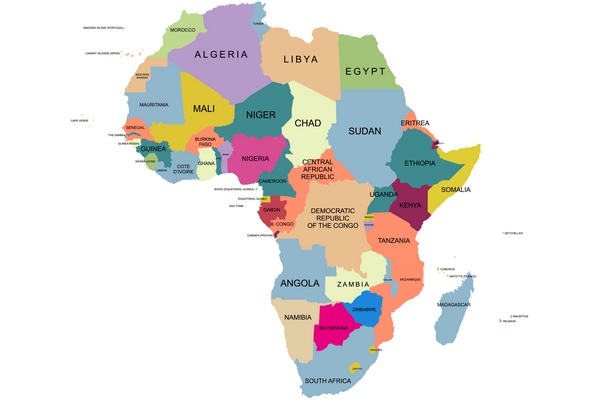

Endorsed by UNWTO: First Tourism Innovation Centre in the America – The Transcript
The Star in the Global Travel and Tourism Industry today is from Jamaica and no other than Edmund Bartlett, Jamaica’s minister of Tourism. The Hon. Edmund Bartlett made his presentation at the ongoing 63rd UNWTO Regional Commission for the Americas and the International Seminar on Women’s Empowerment in the Tourism Sector in Paraguay. The UNWTO Conference is being held in conjunction withthe National Secretariat of Tourism of Paraguay (SENATUR).
A tireless effort was put in by the former UNWTO Secretary-General Taleb Rifai together with Minister Bartlett. and the scene set last year in November with the Montego Bay declaration after concluding the very successful UWWTO Global Conference on Jobs and inclusive growth in Jamaica. Minister Jamaica hosted the event.
The Montego Bay declaration highlighted the need for climate change mitigation and improving crisis preparedness, including a commitment among Caribbean countries to work toward more regional integration and to support a Global Tourism Resilience Center in Jamaica, including a Sustainable Tourism Observatory to help in preparedness, management, and recovery from crises.
This morning at the Regional Commission for the Americas meeting Minister Bartlett made his presentation on establishing and hosting the first Tourism Innovation Centre in the Americas. A first conference is planned in Montego Bay in 2019.
The current UNWTO Secretary-General Zurab Pololikashvil continued to voice UNWTO’s support for a regional center.
Here is a transcript of the presentation made today by the Jamaica Minister and now endorsed and supported by the Regional Commission of the Americas at UNWO
BACKGROUND AND JUSTIFICATION
In the last two decades, many destinations around the world have faced several external threats and internal challenges (together disruptions), which undermine their ability to fully achieve their objectives and potential. These disruptions include, among other things, climate change and natural disasters, cybercrime and cyber-security, epidemics and pandemics, as well as terrorism and wars.
Epidemics and Pandemics
The threat of epidemics and pandemics has been an ever-present reality for tourism due to the nature of the sector which involves international travel and close contact between millions of people. The threat has however become significantly more pronounced over the last two decades.
The world today is hyper connected with the current volume, speed, and reach of travel being unprecedented. Almost 4 billion trips were taken by air just last year alone. The threat of epidemics and pandemics extends beyond the tourism sector and remains a major threat to both health and human security. This has forced the Organization for Economic Co-operation and Development (OECD) to declare pandemics to be global security issues and a Future Global Shock; appealing to countries to commit to higher political and budgetary prioritization of pandemics to promote human security in the same way defense and military expenditures, for example, are prioritized to promote state security.
A 2008 report by the World Bank, warned that a global pandemic that lasts a year could trigger a major global recession while concluding that the economic losses would come not from sickness or death but from what the World Bank calls “efforts to avoid infection”: reducing air travel, avoiding travel to infected destinations, and reducing consumption of services such as restaurant dining, tourism, mass transport, and nonessential retail shopping.
Climate Change and Natural Disasters
Climate change is now the most imminent threat facing the tourism sector and the wider Caribbean region. Warmer temperatures are raising sea levels and producing longer hurricane seasons with stronger and more severe storms. More intense droughts are drying up water resources, vegetation.
and agricultural yields. Rising sea levels are also destroying coastlines, sands, mangroves and eroding beaches. Just last year the passage of Hurricanes Irma and Maria inflicted tremendous damages to 13 of the most tourism-dependent countries in the region including St. Martin, Anguilla, Dominica, Barbuda, St.Barts, The British Virgin Islands, The US Virgin Islands, Turks & Caicos, The Dominican Republic and Puerto Rico. Some territories experienced damage to over 90% of their infrastructure.
Forecasts suggest that the cost of inaction in the Caribbean will amount to 22% of GDP by 2100 and 75% of GDP for some of the more vulnerable economies. This indeed spells a problem for the future of Caribbean economies if the intensity of climate change is not reversed.
Terrorism and Wars
While Jamaica has never faced any serious radical terrorism, we now operate in a new normal where we must be prepared for any eventuality. Recent terrorist attacks in tourist destinations such as Barcelona, Paris, Nice, Tunisia, Egypt, Bohol in the Philippines, Turkey, Las Vegas, Florida and Bali in Indonesia and Algeria have shown that no destination is safe from terror attacks. Increasingly, the radical elements fueling global terrorism are becoming geographically dispersed and are recruiting members from all over the world.
Destination security must become an urgent priority of global tourism players. A serious terror attack can cause significant damage to destination attractiveness, divert itineraries from the affected destinations, undermine future travel and destabilize the affected country’s economy.
Cyber-crimes and Cyberwars
Finally, we currently operate in a highly digitalized world where we are now forced to protect visitors and indeed citizens from both tangible and intangible threats. The digital space has become the marketplace for the tourism industry. Destination research, bookings, reservations, room service and vacation shopping are conducted online via credit card payments. Security no longer means protecting tourists against physical threats but also means protecting people against cyber threats (internet fraud, identity theft, etc.) It is however true that most tourist destinations in the region have no backup plan in the event of cyber-attacks.
While the tourism sector has traditionally been very resilient, the sector is also one of the most vulnerable to these disruptions. In the last two decades, several organizations have also attempted to address some of these concerns, however no one organization exists to holistically provide strategic and operations relations solutions. The absence of such an entity undermines the ability of global destinations to maximize their tourism. This no doubt has wider implications for achieving the goals of the Sustainable Development Goals. Ensuring the resilience of the sector is thus critical to protecting and promoting the well-being of millions of citizens around the world.
The Global Centre for Tourism Resilience and Crisis Management will be called to operate in a global context that is characterized by not only new challenges, but also new opportunities to improve the tourism product as well as to ensure the sustainability of tourism globally. This Centre represents hope and assured continuity of tourism as a local and regional product and as a global enterprise.
2. OBJECTIVES OF THE CENTRE
The aforementioned goal will be achieved through the following objectives:
1. Research and Capacity Building
a. Provide real-time and accurate information related to existing and possible or potential disruptions/risks to destinations;
b. Provide communication, marketing and branding assistance to destinations hit by disruptions/disasters, towards rapid recovery;
c. Provide business intelligence and data analytics information to destinations;
d. Provide policy solutions to governments, international organizations, civil societies and the businesses related to tourism resilience; and
e. Undertake cutting-edge research related to current and potential disruptions or risks to destinations and, to develop mitigation strategies to address these disruptions and risks.
2. Advocacy
a. Provide policy solutions to government, international organizations, civil societies and the businesses related to tourism resilience.
b. Lobby international organizations and all stakeholders to become a part of global thrusts towards tourism resilience and crisis management.
c. Source funding and/or developmental opportunities to improve the quality of the output of regional hotel training institutes such as HEART in Jamaica. This is to ensure sustainability of the tourism industry through improving brand quality. One of the major threats to tourism resilience is the quality of the human capital within the sector.
d. Ensure that organizations honour their commitments made by applying strategic methods of advocacy.
3. Project/Programme Management
a. Plan and implement crisis management systems that will reduce the impact of disasters;
b. Assist the recovery efforts of countries affected by disasters;
c. Monitor the recovery efforts of countries affected by a crisis;
d. Undertake cutting-edge research related to current and potential disruptions or risks to destinations and, to develop mitigation strategies to address these disruptions and risks;
e. Provide training and capacity building in tourism resilience and crisis management;
f. Train and build the capacity of its members in the following areas:
i. Researchers
ii. Crisis and Risk Management Analysts
iii. Tourism Resilience Experts
iv. Tourism Resilience Advocates
v. The Centre will also provide (1) research fellowship opportunity for individuals seeking to either expand their knowledge or gain experience in tourism resilience and crisis management through postdoctoral research, and (2) internships for undergraduate and graduate students in fields of study related to tourism resilience and crisis management;
g. Provide policy solutions to government, international organizations, civil societies and the businesses related to tourism resilience;
h. Host tourism resilience and crisis management forums, conferences, and public discussions geared towards bringing the specialists and experts together to share knowledge and strategies on how to be more resilient and more optimal on managing risks.
4. Monitoring and Evaluation Unit
The Centre will also provide Monitoring and Evaluation services through a Monitoring and Evaluation Unit. This unit will primarily be responsible for the non-stop monitoring of all things related to the tourism sector. The unit will be responsible for the global and regional audit of the tourism sector in an effort to identify seemingly smaller problems that have the potential to cripple the industry as well as unforeseen problems that lack the expert attention. This makes the sector more resilient by providing forecast and foresight. This unit will therefore operate like a watchtower or a lighthouse for tourism globally.
The monitoring thrust of this unit will also be geared towards training individuals to participate in tourism conferences such as the UNWTO conference held in Montego Bay recently, tourism seminars and discussions as well asto keep abreast of the activities, actions, policies and commitments of all core stakeholders of the tourism sector. This unit will establish a global database of all the proposed, committed and ongoing projects or activities by all these stakeholders – essentially a Global Tourism To-Do List. By doing this, the Centre is able to better advocate and lobby stakeholders by reminding them of their commitments as well as to provide information to interested individuals or organizations. This will help to globally streamline tourism activities as well as create a sense of uniformity in global tourism activities.
The Monitoring and Evaluation aspect of the Centre will also take the form of a Virtual Tourism Observatory. Similar, to the European Union Tourism Observatory, this observatory.
aims to support policy makers and businesses develop better strategies for a more competitive global tourism sector.
The Virtual Tourism Observatory will provide access to a broad collection of information, data and analysis on current trends in the tourism sector. The Observatory will therefore be available for the access of all persons who are interested in data on tourism in any country/region. This observatory will enhance academic scholarship by including the latest available figures on the sector’s trends and volumes, economic and environmental impact, and the origin and profile of tourists. The observatory will partner with other similar organizations globally.
The observatory will contain the following information/data:
Country Tourism Profiles.
Tourism statistics with user-friendly and interactive manipulative functions which allows users to access graphs and charts, and to manipulate the data to produce measures of central tendencies and minimal bivariate analysis.
Studies and reports from all around the world that are related to tourism.
Travel advisories for all regions.
Best tourist hotspots and attractions for all regions.
3. PROPOSED GOVERNANCE STRUCTURE OF THE CENTRE
The Centre will be staffed by internationally recognized experts and professionals in the fields of climate management, project management, tourism management, tourism risk management, tourism crisis management, communication management, tourism marketing and branding as well as monitoring and evaluation.
The Centre will be headed by a Director who shall be responsible for the overall management of the Centre and for providing the operational, organizational, and institutional direction of the Centre.
The Director will be assisted by three (3) Programme Offices.
o Programme Office – Advocacy
o Programme Officer – Research and Capacity Building
o Programme Officer – Projects
o Monitoring and Evaluation Officers
The Director and Programme Officers will form part of the Board of Directors. The rest of the board shall be invited to serve based on recommendations made from the Ministry of Tourism, The University of the West Indies, and other stakeholder groups.
The board will be assisted by Researchers, Crisis and Risk Management Analysts, Tourism Resilience Experts, and Tourism Resilience Advocates who will all work towards achieving the objectives of the Centre.
4. LOCATION
The Centre will be housed at The University of the West Indies, Mona Campus (UWI). The Campus has two locations in Jamaica – Montego Bay and Kingston. Founded in 1948, the University of the West Indies is a world-class, accredited higher education institution which engages in research and development designed to support the social and economic growth of the Caribbean region.
The University has a mission to advance learning, create knowledge and foster innovation for the positive transformation of the Caribbean and the wider world. This Mission of the University coincides perfectly with the specific goals of this institute as it provides a platform, through this centre of excellence, to further the university’s mandate of fostering innovation and positive transformation through tourism resilience and development.
Being home to some of the brightest minds, scholars, and researchers from across the region and beyond, the University will appropriately house the Centre providing a natural and ready pool of
resources from which the Centre can access excellent human resource to buttress its efforts. The UWI also provides an environment for partnerships between and among other already established
and streamlined international institutes in the process of sharing knowledge, strategies, and expertise towards achieving the ultimate objectives of the Centre. The University boasts a 8 | P a g e
world-class reputation that will enhance the credibility of the Centre in a symbiotic way as the Centre will also, in its operations, enhance the overall mission and vision of the University.
5. NEXT STEPS
The Centre has been established at the University of the West Indies Mona Campus. We are currently in the process of staffing the Centre as well as building partnerships towards the development of our project profile. Thus far, we have successfully engaged the following entities:
Bournemouth University, England
Campari
Carnival Cruise Line
The University of Queensland, Australia
Digicel
We are also in the process of examining the following global projects on climate action:
1. Global comparative study that explores tourists’ attitudes towards environmental conservation and climate change when traveling.
2. Global comparative study that explores attitudes towards Climate Change.
3. Cross national study that explores resilience and adaptation strategies in response to climate change.
4. Registration.
5. Financing.
6. Summit – Saturday, September 22, 2018.

Farewell to former Lesotho Minister of Tourism
The Honorable Mamahele Radebe, former Minister of Tourism for Lesotho, passed away on Saturday, March 31, 2018, after a long illness.
Thato Mohasoa, who served as Principal Secretary for the Ministry of Tourism Environment and Culture, under the Honorable Minister Mamahele Radebe wrote this tribute in his personal capacity.
We lost Honorable Mamahele Radebe on Saturday, 31st March 2018, after some long illness. We already miss her kind presence and reassuring voice, and if we were to choose, she would still be with us, in good health, here on mother earth.
In her life, this great granddaughter of Chief Lethole of the Makhoakoa (as she affectionately referred to herself), she would see her share of hardship, struggle, uncertainty, lack of offspring of her own, and a loss of a husband to a tragic death. Yet out of those circumstances came a steady, calm and cheerful confidence that life would bring good things. This was the backdrop from which she led her life of principle, compassion, pragmatism, and enormous professional success.
As soon as she retired from an illustrious civil service career, as head of Lesotho’s postal services, she took an active part in Lesotho’s politics, heading north to her home constituency of Hololo, to stand in the elections as a candidate for the All Basotho Convention (ABC). Her moment as Minister of Tourism Environment and Culture arrived in 2012, following the formation of Lesotho’s first Coalition Government. It is in this capacity that both of us came to work together and forged a strong lifetime bond.
As she showed what a minister should be, she also showed us what a human being should be. She carried herself with a decency, attention to small kindnesses, and insatiable humor that also defined a good life. A relationship between a Minister and a Principal Secretary is not easy to manage. These are two people, each endowed with a heavy dose of power. A minister has responsibility to exercise general direction and control over the ministry, while the Principal Secretary is exclusively empowered to provide control and direction over all resources – human and capital. It can, has been, and continues to date, to be a source of deep strive between these two centers of power. It is not a place for blind power mongers. It is a relationship that calls for mutual respect, mutual trust, cooperation, and civility. Our minister had all these qualities. She referred to all of us in the ministry, from myself as her chief advisor, and to all staff, as her colleagues, and treated us as such. But she was much more than that; she was a leader, a counsellor, a mother, and a friend. I learned a lot more from her on the mechanics of the civil service, and on public policy, including on how to navigate the throttling government bureaucracy to get work done, than from anyone I have worked with.
The first Coalition Government established the “Job Summit,” a platform through which government would catalyze job creation and investment promotion. The tourism sector was identified as one of the key pillars of this policy ambition, and we were directed to actualize it. In response, the minister hit the ground running by championing a number of initiatives, which were geared towards repositioning this sector. In the end, among other things, a number of government-owned facilities, which had, hitherto, been rendered as white elephants, were divested to the private sector, through the development of rapid public-private partnership transactions, resulting in increased capital investment, increased employment of Basotho, as well as an upsurge in the number of tourists coming into Lesotho.
Our minister represented our country with dignity on the world stage, and forged meaningful and mutually-beneficial relations on its behalf. Some of us cannot forget her charm that led to the signing of a Memorandum of Understanding between Our Ministry and South-Africa’s Provinces of Kwazulu-Natal and Free-State, on Joint Cooperation on the Cableway Project, on the north-east of the country, along the Drakensberg. In our meeting with the South-African tourism officials, she argued that the coming to life of the project, while it would promote tourism and strengthen trade between the two countries, it would also, in her words, “continue to accessorize our relationship,” citing the successful inscription of the Sehlaba-Thebe National Park, as a world heritage site – a commendable work heavily supported by South-Africa -, as a case in point for continued collaboration.
She fought hard to ensure that Lesotho’s voice was always heard in international platforms. The unfortunate truth about international relations is that it is always biased towards the bigger states. Our minister would not just stand by and accept this as a norm. She was a lead voice for the restructuring of the Regional Tourism Organization of Southern-Africa (RETOSA), and successfully fought against what was manifesting as an oligarchy in charting the region’s tourism agenda. She also strongly advocated for the establishment of an office within the SADC Secretariat which would be dedicated to the Arts and Craft sector, arguing that this sector, as part of the global creative economy, has seen consistent growth and shown capacity to forge even stronger links with the tourism sector in the region.
She fretted over a lack of proper and coordinated management of the environment in Lesotho and longed for the day this matter could be urgently attended to, as a collective government priority. In line with this vision, she made it her mission to personally submit Lesotho’s request before the Executive Director of the United Nations Environment Program (UNEP), to help set up an Environmental Management Agency, a body to be tasked with responsibility for ensuring sustainable management of natural resources, protection of the environment, and for promulgating sound policies and practices.
She was an imperfect politician, for while politics can be divisive and partisan, she made it her habit to reach out to opponents, as and when it was necessary to do so. She would find it effortless to befriend Keketso Rants’o, then of the Lesotho Congress for Democracy (LCD); to request LCD colleague to stand in for her as Minister of Tourism while she was off duty, or for that matter to sit down with her successor, a member of the Democratic Congress (DC) and decently provide guidance, as part of hand over. This is a person who would not shy to complain during Parliament’s recess that she missed watching “Qoo’s antics” in parliament. She was in short, not mean-spirited.
Our minister was benevolent and altruistic. I cannot recall the number of members of her family and of community that she was taking care of; it would be a sick relative, needy members of the community looking for clothing, food or shelter, a member of the party, a rural school, or a church in need. She always found a way around intervening for them. When a staff member was bereaved, she would be the first one to arrive at the home to offer condolences, or if she is far away, she would not hesitate to commiserate by phone, while apologizing for not being there in person. When our National Library team informed her of a plan to donate a “mobile home” to the Maseru Central Prison, for use as classrooms by inmates, she got excited and instructed, “Give them books and stationery as well.”
Our boss had a great sense of humor and possessed ability to laugh out loud into the horizon. When I arrived to help her settle her overrun hotel bill in Vienna, Austria, she joked that I nearly found her already washing dishes in the hotel kitchen, as settlement, quipping, “Here they make you pay even for a sachet of sugar.” For many times she recounted how unfairly she was removed from the Board of the Post Bank, after discovering that she had joined the opposition ABC. The story centers around this particular Board Meeting in which she forgot to put her phone on silence. During the proceedings, her phone rang, and unfortunately for her, in the house full of LCD supporters, her ring tone was an ABC praise-song, which belted out, urging Thabane to take over Mosisili’s government! The house went silent while she frantically reached out to silence the goddam phone. The following day she received a letter of dismissal from the Board. Her typical reaction; she took the letter, looked at it, laughed at it all the way to Hololo where she was going to register to stand as ABC candidate in a by-election in that constituency. The rest, as they say, is history.
We have been missing her for a while now due to ill health, and now death, but her magical effect on the lives of the many of us shall remain for eternity. While we are saddened by her passing on, we draw strength from the Holy Bible (Revelations 21:4) that, “… God shall wipe away all tears from their eyes; and there shall be no more death, neither sorrow, nor crying, neither shall there be any more pain: for the former things are passed away.” We take these words to be true and are comforted that she is out of pain and home safe now with her husband, in heaven.

Brazil has a new Minister of Tourism
Vinicius Lummertz has become the new Minister of Tourism in Brazil.
Previously President of the Brazilian Tourism Board’s – EMBRATUR, Mr. Lummertz takes the position today, April 10, following on from Mr. Marx Beltrão.
Vinicius Lummertz holds a bachelor’s degree in Political Science from the American University of Paris, a postgraduate degree from Harvard University’s Kennedy School, in the IMD of Lausanne, Switzerland, and an Executive MBA from Amana Key in São Paulo.
Lummertz takes on the responsibility of continuing the process of modernizing the sector, reducing bureaucracy and boosting tourism as a strategic activity for the country’s economic growth.
The new chairman of Embratur will be announced in the next days.

Did Zurab Pololikashvi know? UNWTO Ambassador and football star Lionel Messi convicted of tax evasion
The new UNWTO Secretary-General Zurab Pololikashvi loves football. Worldtourismwire yesterday reported about the appointment of Spanish football star Lionel Messi as a UNWTO Ambassador for Responsible Tourism by UNWTO Secretary-General Zurab Pololikashvili after a football match between FC Barcelona and Leganés.
On Saturday the UNWTO Secretary General of the World Tourism Organization (UNWTO) and FC Barcelona signed an agreement, opening the path to collaboration between the two organizations in the areas of tourism and sports.
In 2011-2011, UNWTO Secretary-General Pololikashvili was the General Manager of FC Dinamo de Tbilisi, viewed as the most outstanding professional football team in Georgia.
Tourism is directly related to international security, communication, and interaction between people. Tourism must have a seat at the global table, and the UN World Tourism Organization (UNWTO) is the platform for that within the United Nations.
Exactly a year ago on April 9, eTN asked in an article: How can the leader of this UNWTO platform be elected by a group of country representatives that care more about getting tickets for a popular football game, are following the orders of their foreign minister, and perhaps therefore are not interested in a discussion and exchange, before voting someone into the highest UN official in the travel and tourism industry?
A year later Lionel Messi is officially part of an exclusive UNWTO club of ambassadors, but there is a dark history this star has been trying to cover up.

Considered by many the best football player of all times, Lionel Messi joined the World Tourism Organization to promote the value of responsible tourism. The same man now promoting responsible tourism has been less than responsible when it comes to paying taxes in his home country in Spain.
Spain’s Supreme Court in May of 2017 rejected an appeal by the same Barcelona football star Lionel Messi and stood by a Catalan regional court’s 21-month prison sentence for tax fraud, as reported by REUTERS on May 24, 2017.
Messi and his father Jorge, who managed Messi’s finances, were both convicted in 2016 of defrauding Spain of €4.1m (£3.5m; $4.6m) in taxes.
Jorge Messi’s jail term was reduced because he paid some of the taxes. In Spain, prison terms of under two years can be served under probation.
Lionel Messi, a five-time world footballer of the year, has denied any involvement and told his trial in June 2016: “I only worried about playing football.”
But in its decision, the court said: “It defies logic to concede that someone who earns a large income does not know that he must pay taxes on it.”
Both men were originally convicted of three counts of fraud, for using tax havens in Belize and Uruguay between 2007 and 2009, and were also given heavy fines.
They were found guilty of resorting to fictitious companies to evade Spanish taxes on income from companies using Lionel Messi’s image rights.
Jorge Messi’s jail term was reduced from 21 months to 15 by the Supreme Court to take into account the money he had since handed to the tax authorities.

Dr. Walter Mzembi: Happy with both my footprints at Tourism and Foreign Affairs
Dr. Walter Mzembi was of the most known and respected Minister or Tourism representing one of the most controversial governments when he ran as a candidate for UNWTO Secretary-General last year representing the government of Zimbabwe.
The word is still out among many, Dr. Mzembi was the most qualified UNWTO candidate but couldn’t win because of the government he represented.
The government he represented under ex-president Robert Mugabe was on the “ignore and no talk list” for many countries in the world, and after a soft military takeover in November, this Southern African country has a new face.
Elections are in the pipeline and the new administration has been trying hard to silence those involved with the former regime. Many former public servants were ousted from their political party, others were harassed in many different ways.
A report today in one of Zimbabwe’s most followed online tabloids Zimeye suggests that Mzembi may at the end of this week reenter the political fray on the MDC Alliance ticket led by the 40 year old Advocate and former Minister of ICT in the inclusive government of 2009-13, Mr Nelson Chamisa . Speculation is rife that Mzembi may follow his G40 comrades who recently met Mr Chamisa and seemingly have joined the Alliance to try and fight back at the new regime that unceremoniously dumped them after the exit of Robert Mugabe through a soft coup that installed his former vice president, and now President , Emmerson Mnangagwa.

However, when eTN contacted Dr. Mzembi for a comment he denied any talks with the MDC Alliance.
Whilst very respectful of the MDC Alliance President, Adv Nelson Chamisa whom he says he worked very closely within the inclusive government of 2009- 2013, and referring to him affectionately as” my young brother “, Mzembi says he has not joined the MDC Alliance and is not contemplating such action ahead of 2018 harmonised elections.
Joining them is the quickest and easiest route for me to retain my Parliamentary Constituency, but I am not available for elective politics in 2018, and I will not make such far-reaching decisions at this stage.
Joining a political party or alliance is a nuptial decision, a covenant, and I don’t plunge that easily if I go in, it’s irrevocable, so I haven’t made that decision at all, hakusi kuchaya mapoto”
“There are various and numerous political constituents that are are trying to suck me back into politics by default ahead of 2018 harmonised elections ; let me restate that there is no superior persuasive argument to my pronounced position of 4 December 2017, which announced the beginning of an indefinite political sabbatical and a migration into business and more quality time for a family that “missed ” me during my 15 years of public service. Nothing has changed and readers and political followers are urged to refresh their memory by visiting my interview, done with the Daily News on the 4th of December, 2017. CLICK HERE
Dr. Mzembi’s message: I am still on my sabbatical dismissing MDC Alliance association as social media mischief and fake news.

Africa Conference on Child Protection in Travel and Tourism
Moving forward from Recommendations to Commitments and Action
7 May 2018 | Durban, South Africa
1. Background
In June 2018, an International Summit on Child Protection in Travel and Tourism will be hosted by the Government of Colombia, in collaboration with the World Travel and Tourism Council (WTTC), ECPAT International and other stakeholders. The event will explore accelerated actions for implementation of the Recommendations of the Global Study on Sexual Exploitation of Children in Travel and Tourism (SECTT), and provide a roadmap to address this worldwide challenge. The Global Study was developed in cooperation with 67 partners worldwide (including UNWTO, Interpol and UNICEF). The Study has 46 sector-specific Recommendations for various stakeholders including the private sector (such as travel and tourism companies, the ICT industry and companies whose staff members travel for business). The Recommendations fall under five different intervention areas: awareness raising, prevention, reporting, ending impunity and access to justice, care and recovery and they are aligned to the realisation of the Sustainable Development Goals (SDGs) – a number of which relate to child protection and sustainable tourism. The Study was guided by a High-Level Taskforce and informed by detailed studies from every region and several countries, as well as contributions from experts and children. It presents the most updated picture of the problem of the sexual exploitation of children in travel and tourism, including in Africa and its Recommendations are key for improving private sector responses to prevent and combat this crime. Its findings confirm that no region is untouched by this challenge and no country is ‘immune’.
2. Rationale for the Conference
Two years after the launch of the Global Study, the need for coordinated efforts to ensure systemic translation of commitments into action cannot be over emphasised. This has been called for at various meetings including, at a Conference on Combatting Sexual Exploitation of Children in Travel and Tourism (SECTT), held in South Africa, in June 2017, and at the ‘Transition Meeting’ for the Global Study, in July 2017. At both meetings, key stakeholders as well as partners of the Global Study called for coordinated action for combatting SECTT and committed to concrete actions against
a call for a Regional Conference on Child Protection in Travel and Tourism was made by the then Chairperson of the UNWTO Commission for Africa.
In September 2017, the UNWTO adopted the text for a Framework Convention on Ethics in Tourism, which is a binding instrument with provisions on child protection and obliges States Parties to enforce at national level once they ratify it upon its entry into force. As States and the private sector seek to promote Sustainable Tourism for Development, children’s right to protection from violence and exploitation should be at the heart of all actions within the framework of ethical and responsible business practices. The private sector is a key stakeholder in ensuring that effective mechanisms are put into place for tourism to thrive sustainably, without subjecting children to any form of exploitation. Thus, there is a need to continuously promote and facilitate the implementation of the Global Study Recommendations to ensure that child protection remains in the tourism agenda. Various stakeholders in the region have already taken steps in child protection or are already in the process of doing so. These include the Africa Airlines Association (AFRAA), airline companies (such as South African Airways, Rwanda Air, Ethiopian Airlines, Kenya Airways), ACCOR Hotels in Africa and Fair Trade and Travel (FTT). Globally, major hotel and travel companies have been standard-bearers in the application of The Code of Conduct for the protection of SECTT. At the South Africa Conference, children in travel and tourism, such as Carlson Wagonlit Travels, AccorHotels, Hilton and TUI. A number of companies, including well-known brands such as Marriott, Uber USA and American Airlines have acknowledged the gravity of the problem and have also decided to join The Code. In view of these developments, and as a build-up to the International Summit, regional conferences on child protection in travel and tourism will be held. In Africa, the event will be hosted prior to the Africa Travel Indaba, which brings together the private sector from across Africa.
3. Objectives of the Conference
The main objective of the Conference is to expand and strengthen political will and actions in protecting children in travel and tourism based on the Recommendations of the Global Study on SECTT, as a regional contribution towards achieving the SDGs.
The Conference will therefore have the following sub-objectives:
a. To facilitate high-level dialogue with representatives of the tourism industry to enhance responsible business practices in protecting children in travel and tourism.
b. To share promising practices by leading travel and tourism companies in Africa with the view of
providing a regional contribution to the International Summit on Child Protection in Travel and
Tourism that will result in formulating global commitments.
c. To enhance regional cooperation to ensure child protection in travel and tourism.
Format of the Conference
It is envisioned that the Conference will be multi-sectoral and organised in partnership and collaboration of key stakeholders in the travel and tourism industry such as the UNWTO Commission for Africa, Tourism Ministries, African regional entities, UN agencies, private sector representatives and CSOs.
The format of the conference will comprise keynote speeches by high-level representatives of Tourism Ministries and travel and tourism industry. There will be panel discussions and dialogue by key stakeholders to share their practices and commitment towards child protection in travel and tourism. The Conference is scheduled to coincide with the African Travel Indaba to maximise and build on the growing commitments of Tourism Ministries towards sustainable and responsible tourism, as well as to access wide participation of the travel and tourism industry at the event.
The conference is expected to adopt a Private Sector Commitment to Child Protection in Travel and Tourism in Africa, which will be presented to the UNWTO Commission for Africa’s annual conference and the International Summit on Child Protection in Travel and Tourism, both of which will be held in June 2018 in Nigeria and Colombia, respectively.
5. Participants
The Conference is expected to attract 100 participants, drawn primarily from African governments, the African Union, Regional Economic Commissions (RECs), the private sector (including hotels, airline companies, travel agencies and tour operators, taxi companies, ICT companies and banks), police forces, UN agencies, INGOs, CSOs, the media and individual experts.
6. Date and Host Country
The Conference will be held on 7 May 2018 in Durban, South Africa, to coincide with the Africa Travel Indaba.
7. Contacts
For more information, please contact:
Ms Violet Odala, Specialist on SECTT, Africa
ECPAT International. Email: [email protected]

African Tourism Board accepting applications for founding members
Here is a chance to be involved in the new African Tourism Board right from the beginning. The organization is still accepting nominations for founding members.
The African Tourism Board is soon to be officially launched. Members will not only include Tourism Boards, Ministers of Tourism and both government and private association, but public figures, government representatives, and private stakeholders including DMC’s, CVB’s, Investment Banks, Law-firms, and consultants.
“It’s all about marketing and outreach. We hope to be able not to involve our organization into political issues and our mission is to encourage African countries to work together, sharing joint tourism opportunities and assist with projects, investments important to the African Travel and Tourism Industry. There is so much potential and this can be done easier united”, said one of the soon-to-be-announced tourism leaders and founding member.
Currently, the African Tourism Board is accepting applications or nominations for founding members and marketing partners.
Some activities including road shows in North America, virtual outreach, investment opportunities, PR, and media relations, a security, and tourism Wellbeing Summit in Africa (to be announced), a special roadshow for the MICE Industry on the sideline of IMEX America are already in the pipeline. Such initiatives are facilitated in close cooperation with the International Coalition of Tourism Partners (ICTP)
The African Tourism Board hopes to work hand in hand with Brand Africa, Retosa, African Union, UNWTO, WTTC, the World Tourism Alliance, ICTP, ATA, the aviation and hospitality industry and other initiatives important to further Tourism to Africa.
The organization is welcoming members throughout Africa and the world. For more information and an application to voice your interest go to https://africantourismboard.com/join/
The official launch is planned later this year.

UNWTO Secretary General meets President of Azerbaijan
The Secretary-General of the World Tourism Organization (UNWTO), Zurab Pololikashvili met H.E. Mr. Ilham Aliyev, President of Republic of Azerbaijan to discuss the development of the tourism sector in the country and how to further strengthen cooperation between Azerbaijan and UNWTO.
The following issues were addressed during the meeting: the 10th Anniversary of the Baku Process, the impressive growth of international arrivals to Azerbaijan which peaked at +20% in 2017; the support of UNWTO to Azerbaijan in the implementation of investment projects, visa facilitation, open skies policy, the reinforcement of cooperation within the UNWTO Executive Council and UNWTO assistance to the country in the areas of innovation and education.
“In 2017, Azerbaijan saw international tourist arrivals grow by an impressive 20%. This enormous growth is the result of supportive policies on issues such as visas and investment, government commitment and leadership. I congratulate Azerbaijan for this success, which is far above the global average growth for 2017 of 7% in the world and look forward to strengthening our already solid cooperation” said the Secretary-General.
During his official visit, the Secretary-General also met Mr Abulfas Garayev, Minister of Culture and Tourism of the Republic of Azerbaijan, to discuss overall cooperation opportunities with UNWTO.
In the coming days, Mr Pololikashvili will open the 17th Azerbaijan International Travel and Tourism Fair and address the Azerbaijan Tourism and Management University (ATMU).
